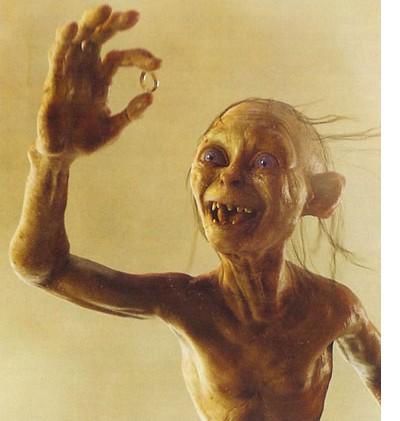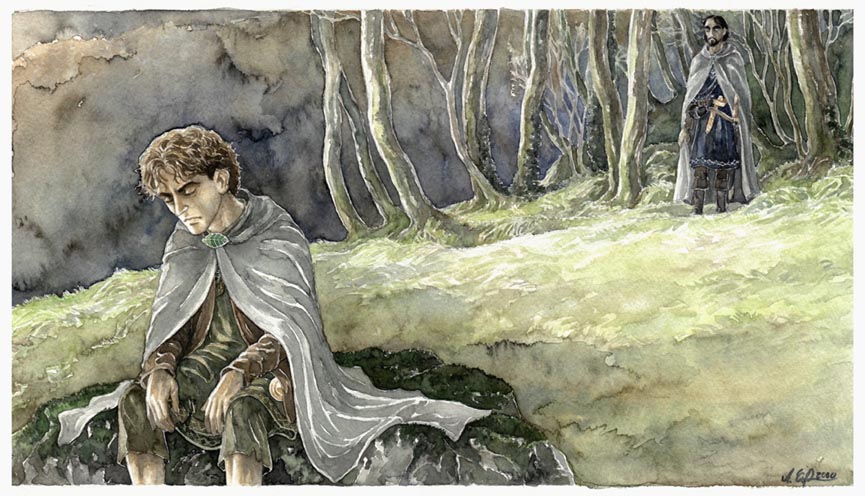The Two Towers by J.R.R Tolkien (Harper Collins 1991, 2007) pp. 851-861
I am glad that Frodo and Sam were able to eat the rabbits that Gollum caught before they were caught by the men of Gondor in the woodlands of Ithilien and I am glad that they were able to rest upon a bed of fern that must have felt like the greatest luxury. To be well fed and well rested is of great help when you need to keep your wits about you. I am only sorry that they were not able to smoke a pipe as well but then perhaps they did not have their pipes or pipeweed with them.

Gollum is expressing his extreme displeasure at the building of a fire and the cooking of meat.
Frodo and Sam are in Ithilien, the garden of Gondor, Although it bears the unmistakable signs of Mordor upon it after a few years of occupation it remains a place of beauty and of plenty too. They are surrounded by herbs that grow in profusion and perfume the air, and there are game creatures about that Sam can cook.
The hobbits have eaten nothing more than lembas for about a week now and although it is wonderfully sustaining and even more so when it isn’t mingled with any other kind of food lembas cannot satisfy them in the particular way that a well cooked meal could and Sam, in particular, desires that particular satisfaction.
Perhaps it was always unwise to light a fire in a place where enemies might be lurking, certainly Gollum thinks so, but a fire is necessary if you are going to cook, and maybe if Sam hadn’t relaxed a little too much after eating a good meal then he would not have committed the cardinal error that all children are warned against when learning to make a campfire. Never leave it unattended.
But Sam did make this mistake and a small brand from the fire did start a blaze in a pile of fern lying nearby and the smoke from the fire was spotted by the Rangers of Ithilien, and the hobbits were caught.
These Rangers are a company of men from Gondor who are operating behind enemy lines in the woodlands of Ithilien. Their mission is to make sure that the forces of Gondor can never feel completely at ease in this land. They harry and harass their foes and on this day it is their intention to ambush a force that is travelling northwards from Harad to enter Mordor through the Black Gate, just the kind of force that the hobbits saw on the day when Frodo decided to trust Gollum as his guide into the dark land.
The Rangers are commanded by Faramir, son of Denethor, Steward of Gondor, and the brother of Boromir, who had travelled as part of the Fellowship from Rivendell until he fell at Parth Galen as he sought to defend Merry and Pippin from capture by the Uruk-hai of Isengard. And it was this same Boromir that tried to take the Ring from Frodo and so made him take the decision to go on alone to Mordor. As far as Frodo and Sam are concerned Boromir is still alive and Frodo’s last memory of him is of the madness that overcame him and led him to try to seize the Ring by force.

I have long appreciated the depictions of Faramir by the artist, Anke Eissman. Note how he sits on the ground before his captive and does not seek to dominate him by standing, but his authority is still unmistakable.
So at the moment of their capture Frodo and Sam do not know what kind of trouble they are in and Sam does not know whether he will ever be able to forgive himself or whether he will ever get the opportunity to do so. He cannot know that he has fallen into the hands of one of the noblest of all Tolkien’s creations and that much good will come of this encounter.
We might say that the “chance” meeting between the hobbits and Faramir is mere coincidence, if any circumstance in our lives can ever be described with the word, mere. It was the great Swiss psychologist, Carl Jung, who first coined the word, synchronicity, to describe a series of unrelated events that are connected through their meaning and the meeting of the hobbits and Faramir is a profound expression of this. Later, before they parted, Frodo says to Faramir that Elrond had told him that he would find unexpected friendship upon his journey and we will think more of this on another occasion but it is sufficient to say on this occasion that Sam can forgive himself for his “mistake”, if mistake it truly is.




















